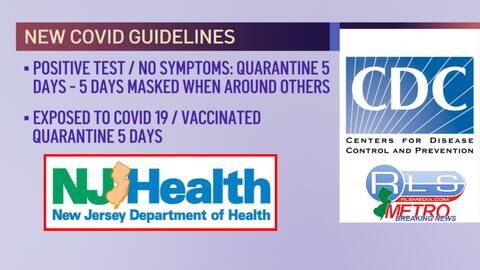Based on new recommendations from the Centers for Disease Control and Prevention (CDC), the New Jersey Department of Health (NJDOH) is updating its guidance on isolation and quarantine periods for both the public and healthcare providers.
“Based on the latest science and data—that demonstrates transmission occurs early on in the course of illness—new isolation and quarantine recommendations have been developed to address the spread of COVID-19,” said Health Commissioner Judith Persichilli.
“This data underscores the importance of vaccination, especially receiving a booster dose.
The Department encourages vaccination against COVID-19 for everyone 5 and older and boosters for everyone 16 and older to help slow the spread of COVID-19 in our state.”
NJDOH is in the process of updating guidance documents for the general public to reflect CDC’s guidance, which shortens the recommended time for isolation from 10 days for individuals with COVID-19 to 5 days, if they do not have symptoms, followed by 5 days of wearing a mask when around others.
NJDOH is adopting changes to the recommended quarantine period for members of the general public who have been exposed to COVID-19. Per CDC, individuals who are unvaccinated or are more than six months out from their second dose of Moderna or Pfizer vaccine or more than 2 months after the J&J vaccine and not yet boosted, should quarantine for 5 days followed by strict mask use for an additional 5 days.
Individuals who have received their booster vaccine do not need to quarantine following an exposure, however, they should wear a mask for 10 days after the exposure.
NJDOH is also updating its guidance to reflect CDC recommendations on isolation and quarantine for healthcare workers to decrease isolation time after COVID-19 illness.
Healthcare workers with COVID-19 who are without symptoms can return to work after 7 days with a negative test, and isolation time can be reduced further if there are staffing shortages.
Healthcare workers who have received all recommended COVID-19 vaccine doses, including a booster, do not need to quarantine at home following high-risk exposures.
The Department expects to release its guidance documents in the coming days, in the meantime residents and healthcare providers should refer to CDC guidance.
“Residents should also continue to take precautions such as wearing a mask when in public indoor spaces, washing hands frequently and staying home when sick,” added Persichilli.
